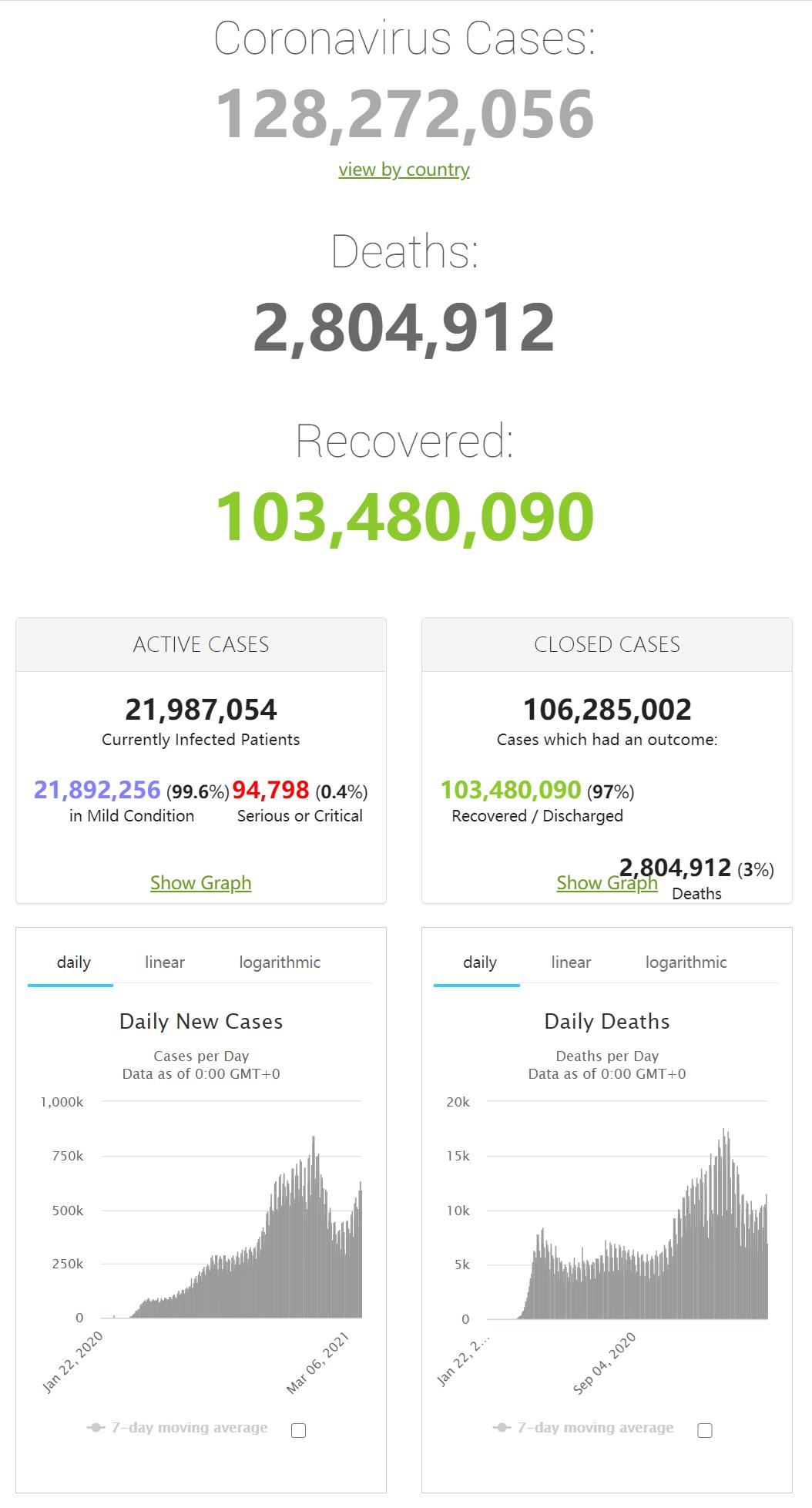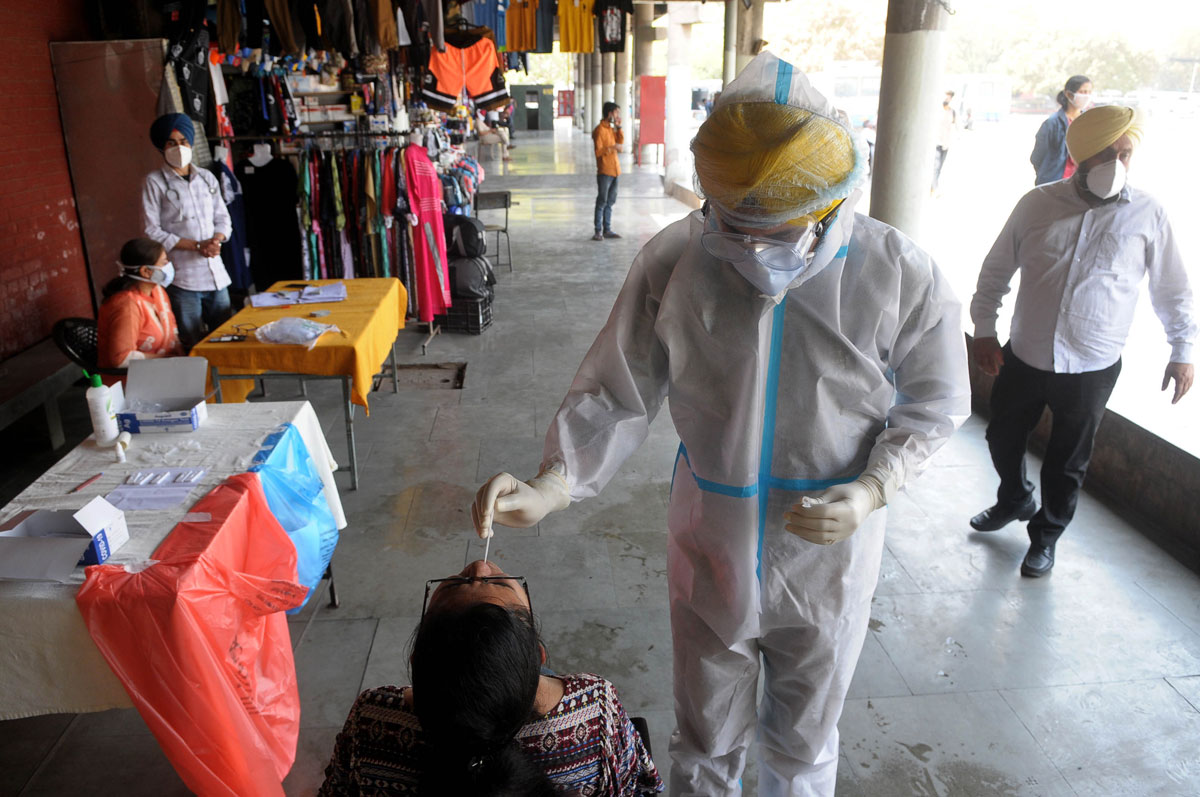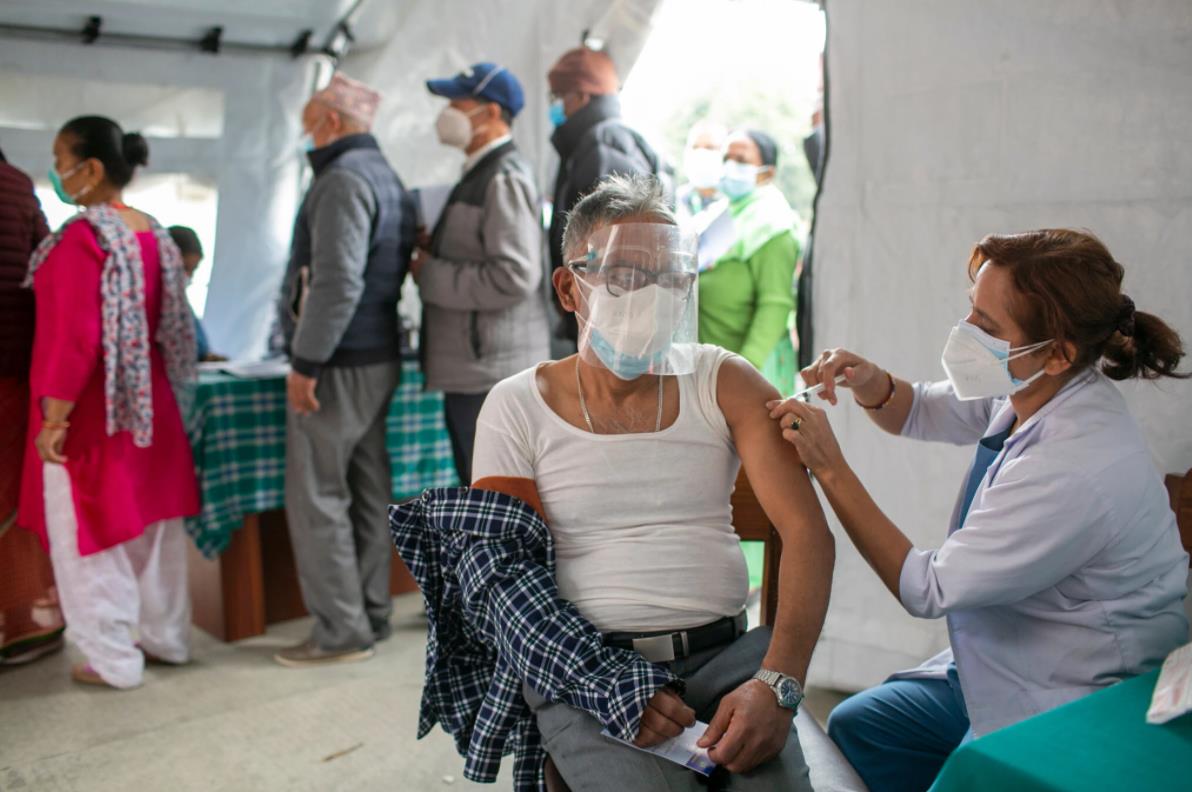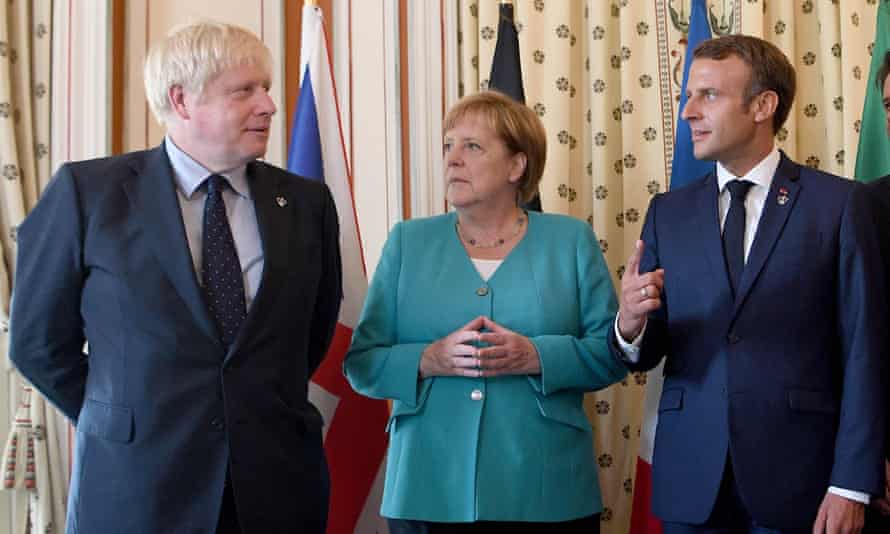
 i_need_contribute
i_need_contribute


|
Country, |
Total |
New |
Total |
|
World |
128,230,670 |
+441,886 |
2,804,090 |
|
31,033,801 |
+59,707 |
563,206 |
|
|
12,577,354 |
+42,666 |
314,268 |
|
|
12,095,329 |
+56,119 |
162,147 |
|
|
4,554,683 |
+9,094 |
94,956 |
|
|
4,528,543 |
+8,711 |
98,033 |
|
|
4,337,696 |
+4,654 |
126,615 |
|
|
3,544,957 |
+12,916 |
108,350 |
|
|
3,270,825 |
+6,120 |
75,199 |
|
|
3,240,577 |
+32,404 |
31,230 |
|
|
2,796,400 |
+10,055 |
76,599 |
|
|
2,389,779 |
+7,049 |
63,079 |
|
|
2,322,611 |
+14,014 |
55,611 |
|
|
2,267,964 |
+16,965 |
51,932 |
|
|
2,226,550 |
+1,783 |
201,623 |
|
|
1,864,984 |
+9,310 |
62,478 |
|
|
1,652,409 |
+8,346 |
32,132 |
|
|
1,545,979 |
+548 |
52,710 |
|
|
1,533,121 |
+3,239 |
51,635 |
|
|
1,516,803 |
+1,735 |
26,137 |
|
|
1,501,093 |
+5,008 |
40,581 |
|
|
1,259,155 |
+6,718 |
16,475 |
|
|
984,484 |
+7,241 |
23,070 |
|
|
971,718 |
+4,573 |
22,900 |
|
|
940,443 |
+3,825 |
23,234 |
|
|
870,757 |
+4,694 |
22,897 |
|
|
838,265 |
+5,837 |
14,249 |
|
|
832,125 |
+201 |
6,197 |
|
|
820,716 |
+309 |
16,843 |
|
|
731,894 |
+10,016 |
13,186 |
|
|
659,116 |
+4,525 |
14,256 |
|
|
641,124 |
+7,263 |
20,161 |
|
|
600,895 |
+5,181 |
8,949 |
|
|
597,256 |
+7,940 |
6,651 |
|
|
590,018 |
+4,512 |
5,231 |
|
|
539,541 |
+3,076 |
9,275 |
|
|
494,756 |
+97 |
8,807 |
|
|
468,614 |
+1,765 |
9,061 |
|
|
462,339 |
+1,277 |
6,136 |
|
|
457,071 |
+1,874 |
1,486 |
|
|
388,866 |
+541 |
6,656 |
|
|
358,115 |
+205 |
9,542 |
|
|
354,085 |
+246 |
6,103 |
|
|
342,885 |
+941 |
1,260 |
|
|
333,250 |
+4,497 |
12,913 |
|
|
325,124 |
+642 |
16,746 |
|
|
319,599 |
+918 |
2,227 |
|
|
280,472 |
+171 |
3,765 |
|
|
276,980 |
+141 |
3,027 |
|
|
269,628 |
+326 |
12,186 |
|
|
267,522 |
+300 |
5,911 |
|
|
257,330 |
+1,129 |
3,513 |
|
|
255,755 |
+1,724 |
7,945 |
|
|
252,182 |
+199 |
3,307 |
|
|
251,169 |
+604 |
8,760 |
|
|
241,873 |
+1,492 |
3,014 |
|
|
238,248 |
+1,786 |
2,599 |
|
|
235,078 |
+537 |
4,667 |
|
|
229,550 |
+1,251 |
1,298 |
|
|
228,692 |
+679 |
2,415 |
|
|
227,453 |
+932 |
4,869 |
|
|
214,381 |
+428 |
3,561 |
|
|
212,966 |
+287 |
4,024 |
|
|
210,425 |
+1,770 |
4,113 |
|
|
202,545 |
+1,982 |
2,825 |
|
|
200,739 |
+689 |
11,914 |
|
|
193,556 |
+179 |
6,809 |
|
|
190,741 |
+424 |
3,476 |
|
|
187,460 |
+445 |
4,558 |
|
|
178,464 |
+690 |
286 |
|
|
162,641 |
+48 |
2,049 |
|
|
157,943 |
+1,288 |
1,577 |
|
|
157,545 |
+696 |
2,653 |
|
|
156,883 |
+796 |
1,662 |
|
|
142,669 |
+824 |
515 |
|
|
142,393 |
+8 |
3,206 |
|
|
131,116 |
+902 |
2,135 |
|
|
127,240 |
+302 |
3,716 |
|
|
124,419 |
+285 |
2,216 |
|
|
116,946 |
+110 |
3,084 |
|
|
104,214 |
+584 |
879 |
|
|
102,141 |
+384 |
1,726 |
|
|
101,207 |
+167 |
1,883 |
|
|
99,584 |
+2,178 |
928 |
|
|
94,139 |
+1,321 |
660 |
|
|
92,303 |
+215 |
566 |
|
|
90,418 |
+335 |
1,256 |
|
|
90,182 |
+15 |
4,636 |
|
|
88,163 |
+71 |
1,497 |
|
|
88,012 |
+140 |
1,200 |
|
|
82,536 |
+196 |
626 |
|
|
76,425 |
+422 |
822 |
|
|
73,204 |
+701 |
417 |
|
|
44,991 |
+360 |
254 |
|
|
28,773 |
+39 |
94 |
|
|
9,294 |
+35 |
82 |
|
|
9,104 |
+7 |
177 |
|
|
2,594 |
+3 |
35 |
Retrieved from: https://www.worldometers.info/coronavirus/
From CNN’s Sandi Sidhu and Maggie Fox
Covid-19 probably came to people through an animal and probably started spreading no more than a month or two before it was noticed in December of 2019, a World Health Organization draft report finds.
The least likely source is a laboratory leak, WHO’s joint international team concluded.
WHO is scheduled to release the final report on its investigation into the origins of coronavirus on Tuesday, but a draft version of the report obtained by CNN shows there’s still no smoking gun and no evidence suggesting the virus was spreading any earlier than the very end of 2019.
The report gives four possible sources for the virus and the most likely scenario is via an intermediate animal host, possibly a wild animal captured and then raised on a farm.
But the investigation has not found what the intermediate host might be. “The possible intermediate host of SARS-CoV-2 remains elusive,” it reads.
Next likely is direct transmission from one of the animals known to carry a similar coronavirus, such as a bat or a pangolin. Possible but not probable is transmission from frozen or chilled food, and least likely is an accidental laboratory release, the report finds.
Dr. Robert Redfield, former director of the Centers for Disease Control and Prevention, told CNN’s Dr. Sanjay Gupta, that his personal opinion was the virus was released from a lab. The report says this is “extremely unlikely.”
“There is no record of viruses closely related to SARS-CoV-2 in any laboratory before December 2019, or genomes that in combination could provide a SARS-CoV-2 genome,” it reads. “In view of the above, a laboratory origin of the pandemic was considered to be extremely unlikely.”
The role of the Huanan seafood market in Wuhan is also unclear. It’s possible the market was not the original source of the outbreak, but that the crowds that gathered at the market – which was densely packed, with a roof and open sewers – may have amplified the spread of the virus.
Samples found at the market showed the virus was there on surfaces, but no samples taken from animals or food sold at the market turned up the virus. Plus, there is evidence the virus was circulating before the Huanan market outbreak – including at other markets. “No firm conclusion therefore about the role of the Huanan market in the origin of the outbreak, or how the infection was introduced into the market, can currently be drawn,” the report concludes.
It recommends more testing of blood samples taken and stored before the first outbreak in December, more testing of animals from Southeast Asia, and more in-depth study of mass gatherings that could have aided the spread of the virus.
From CNN's Jason Hoffman
The Biden administration will wait for government experts to conduct an independent review of the World Health Organization’s report on the origins of the coronavirus before announcing any steps forward, White House press secretary Jen Psaki said Monday.
The report could be released to the public as soon as tomorrow after the agency's member states receive a briefing on it, WHO’s Director-General Tedros Adhanom Ghebreyesus said in a news conference earlier today.
When asked by CNN’s Phil Mattingly if the administration puts any stock into WHO’s findings, Psaki said the reporting is being reviewed by 17 experts across government agencies, including the US Centers for Disease Control and Prevention, the Food and Drug Administration, the National institutes of Health and others. Psaki said those public health experts “will be reviewing this report intensively and quickly.”
“We will wait for that review to conclude. We have been clear that an independent, technically sound investigation is what our focus is on, and once this is reviewed we'll have an assessment about the steps forward,” she said.
Psaki also added that the US is communicating with its allies “to share our ongoing concerns, which we have stated in the past, of course, about the process and our scientific analysis of the report itself.”
While the report has not yet been released, a source with knowledge of the report tells CNN that it finds animal to human transmission is the most likely cause of the Covid-19 pandemic.
The source said the report will find that it is most likely that “a bat, somewhere in China or in Southeast Asia, getting the virus into animals into the intermediate house, maybe in these wildlife farms that were very common at the time across South China, and then that getting into the market in Wuhan.”
The report deems it extremely unlikely that Covid-19 leaked from a Wuhan lab, according to the source.
From CNN’s Chloe Adams and Bear Hutchinson

World Health Organization Director General Tedros Adhanom Ghebreyesus speaks during a press conference on Monday, March 29. WHO
All hypotheses into the origins of the novel coronavirus are on the table and warrant complete and further study ahead of a long-awaited report that will be released on Tuesday, the World Health Organization’s Director General Tedros Adhanom Ghebreyesus said during a news conference in Geneva on Monday.
Tedros said the WHO received the full mission report over the weekend on the origins of the SARS-Cov-2 virus from the team that visited Wuhan earlier this year and this report was sent to member states under embargo. He said the two news agencies reporting details of a leaked mission report are only a draft or near final wording of the report.
He stressed the report is not public yet and there will be a briefing on Tuesday with member states about it.
“After the briefing to the member states, it will be public, it will be on WHO’s website. As you know, the international experts are expected also to hold a press conference after the posting of the report. And we will read the report and discuss, digest its content and next steps with member states,” Tedros said.
However, he cautioned: “All hypotheses are on the table, and warrant complete and further studies from what I have seen so far.”
From CNN's Esha Mitra in New Delhi

A health worker collects a swab sample from a person for Covid-19 testing on March 27 in Chandigarh, India. Ravi Kumar/Hindustan Times/Getty Images
India recorded 68,020 new coronavirus cases Monday, another single-day record since last year and the the sixth consecutive day that India has seen a record-high in cases in 2021.
The surge comes as Indians mark the festival of Holi, a celebration of colors, on Monday. Several states have banned public gatherings and the health ministry has asked citizens to celebrate with their family as opposed to venturing outdoors.
India has so far recorded more than 12 million cases of Covid-19. At least 161,843 people have died, according to official data.
The Indian Ministry of Health said that 60,530,435 vaccine doses have been distributed since mid-January.
Retrieved from: https://edition.cnn.com/world/live-news/coronavirus-pandemic-vaccine-updates-03-30-21/index.html

A vaccination center in Kathmandu, Nepal, this month.Credit...Niranjan Shrestha/Associated Press
KATHMANDU, Nepal — Nepal on Monday received a donation of 800,000 doses of a Covid-19 vaccine from China, which the authorities said would help them restart an inoculation drive that had been halted because of shipment delays in India.
Dr. Jageshwor Gautam, a spokesman for the ministry of health, said the vaccination campaign could resume in less than a week, “once we determine beneficiary age groups.”
China and India, both of which border Nepal, have been jockeying for influence over the Himalayan nation of 30 million people, most recently through vaccine diplomacy.
Nepal had planned its vaccination campaign around the Oxford-AstraZeneca vaccine manufactured by the Serum Institute of India, the world’s largest vaccine producer. One million doses have been donated by the Indian government, and Nepal had bought an additional two million doses from the Serum Institute.
But half of the purchase from the Serum Institute has been delayed indefinitely, health officials in Nepal said, despite an agreement that it would arrive 15 days after the deal. India, which is supplying the AstraZeneca vaccine to more than 70 countries, has begun holding back nearly all of its exports as it tries to suppress a surge in coronavirus cases at home.
Officials in Nepal suspended vaccinations on March 17, citing the shortage of doses.
To fill the gap, they are now relying on a vaccine developed by the Chinese company Sinopharm, which last month became the second approved for emergency use in Nepal after Beijing pledged to provide doses free.
Since its vaccination drive began in late January, Nepal has administered about 1.6 million doses, according to a New York Times database. Dr. Gautam said the 500,000 remaining AstraZeneca doses would be given to frontline health workers, and that there were none available for the rest of the population “at least for now.”
Nepal has recorded almost 277,000 infections and 3,027 deaths, according to a New York Times database. Although the country’s average daily new cases are a small fraction of what they were at their peak last fall, health officials fear a second wave as infections surge in neighboring India. On Monday, India reported 68,020 new infections, the highest one-day rise since October.
Retrieved from: https://www.nytimes.com/live/2021/03/29/world/covid-vaccine-coronavirus-cases/nepal-turns-from-india-to-china-for-help-resuming-vaccinations

The vaccine, which requires only a single shot, comes from Johnson & Johnson’s Janssen subsidiary.Credit...Stephen Zenner/Getty Images
A concert for 5,000 people was held at a Barcelona arena on Saturday, one of several planned in Europe to test how crowds can gather
Johnson & Johnson said on Monday that it would supply its one-shot Covid-19 vaccine to African Union member states, as the continent experiences a slow rollout of vaccines, an uptick in cases and worries about new mutations of the coronavirus.
The pharmaceutical company said that its unit, Janssen Pharmaceutica NV, had agreed to a deal with the African Vaccine Acquisition Trust, an African Union organization, to supply up to 220 million doses of its Covid-19 vaccine beginning in the fall. The organization will also have the option to order an additional 180 million doses for a combined total of up to 400 million doses through 2022.
The company will supply most of the doses from a plant in South Africa, which is operated by Aspen Pharma. The African Export-Import Bank, a pan-African bank based in Cairo, will pay manufacturers $2 billion on behalf of member countries in the form of loans.
South Africa’s president, Cyril Ramaphosa, who as chairman of the African Union set up the vaccine trust last year, was expected to tour the Aspen Pharma facilities in Port Elizabeth, on the country’s southeast coast, on Monday.
“This agreement is a significant milestone in protecting the health of all Africans,” Mr. Ramaphosa said in a statement. “It is also a powerful demonstration of African unity and of what we can achieve through partnership between the state sector, the private sector and international institutions that puts people first.”
The announcement came as coronavirus cases surpassed 4.1 million in Africa, with more than 111,000 deaths, according to the Africa Centers for Disease Control and Prevention. Concerns have been mounting about the emergence of variants on the continent, particularly in countries like South Africa, where a highly transmissible variant has driven up cases. Scientists also recently said they found a highly mutated variant of the coronavirus in travelers from Tanzania, the East African nation whose leaders have consistently brushed aside the virus threat.
Besides facing other deadly outbreaks including Ebola, polio and measles, many nations in Africa are also dealing with vaccine inequity, as developed nations hoard doses and seek to inoculate their entire populations. So far, only 7.7 million vaccines have been administered on the continent, according to the World Health Organization, which last week warned of a slowdown in deliveries even as initial batches were exhausted.
Vaccines have yet to arrive in 10 African countries, the W.H.O. said, while many others continue to face logistical challenges in addition to vaccine hesitancy.
Nations including South Africa have called on governments and pharmaceutical companies to waive vaccine patents to get medicines to more people more quickly.
The Africa C.D.C. has said that at least 60 percent of the continent’s population — or 750 million people — must be vaccinated if the virus is to be curbed there. The deal with Johnson & Johnson “enables Africa to meet almost 50 percent of that target,” Dr. John Nkengasong, the head of the Africa C.D.C., said in a statement.
“The key to this particular vaccine is that it is a single-shot vaccine, which makes it easier to roll out quickly and effectively, thus saving lives,” he added.

Boris Johnson with Angela Merkel and Emmanuel Macron at the EU meeting during the G7 summit in 2019 Photograph: Andrew Parsons/PA
The world needs a global treaty for pandemics to protect states in the wake of Covid-19, akin to the settlement forged after the second world war, Boris Johnson and other world leaders have urged.
In a joint article published in newspapers across the world, leaders including the UK prime minister, the French president, Emmanuel Macron, and the German chancellor, Angela Merkel, warn that a future global pandemic is an inevitability and that Covid has served as “a stark and painful reminder that nobody is safe until everyone is safe”.
Escalating international tensions over vaccine supplies have led to calls for countries to abandon isolationism and nationalism, and come together to make way for a new era founded on principles like solidarity and cooperation.
The call comes from 24 world leaders, alongside the head of the World Health Organization, Tedros Adhanom Ghebreyesus, and will appear in newspapers including the Telegraph in the UK, Le Monde in France and Frankfurter Allgemeine Zeitung in Germany.
The leaders describe the pandemic as “the biggest challenge to the global community since the 1940s” and said that a settlement like the one formed after 1945 is needed to build cross-border cooperation before the next international health crisis.
In the joint article, they say: “At that time, following the devastation of two world wars, political leaders came together to forge the multilateral system. The aims were clear: to bring countries together, to dispel the temptations of isolationism and nationalism, and to address the challenges that could only be achieved together in the spirit of solidarity and cooperation, namely peace, prosperity, health and security.”
A treaty on pandemics “should lead to more mutual accountability and shared responsibility, transparency and cooperation within the international system and with its rules and norms”, the leaders go on.
Johnson has advocated for some time for a fresh and more collaborative global approach to pandemics. Last month, he petitioned fellow G7 leaders to back the proposal, emphasising the need for better international health data-sharing.
It followed concerns that China withheld information and access from global health inspectors as they investigated the origins of Covid-19 and how the virus spread.
The G7, made up of the world’s leading industrial nations and of which Johnson is president this year, agreed to explore the idea and is to discuss it further at a summit in Cornwall in June.
Johnson has also led calls for richer nations to give surplus vaccine supplies to the UN-led Covax system for distributing vaccines to poorer countries. The G7 is also moving towards providing financial support for developing countries whose economies have been hit particularly hard by the pandemic.
Retrieved from: https://www.theguardian.com/world/2021/mar/30/global-treaty-needed-to-protect-states-from-pandemics-say-world-leaders